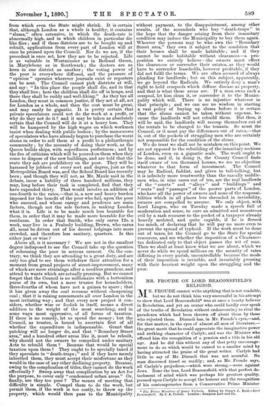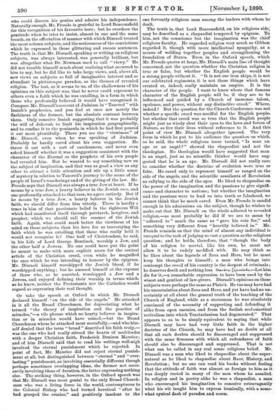MR. FROUDE ON LORD BEACONSFIELD'S RELIGION.
FROUDE cannot write anything that is not readable,
but we do not think him very successful in his attempt to show that Lord Beaconsfield* was at once a hearty believer in Revelation, and yet an orator who could hardly ever speak of the truths of Revelation without endeavouring to rival the paradoxes which had been thrown off about them by those who rejected them. Disraeli has, in Mr. Froude's eyes,—and, for that matter, in the eyes of almost all men of literature,— the great merit that he could appreciate the imaginative power and striking character of Carlyle, and was the Minister who offered him the recognition of a pension and a title in his old age. And he did this without any of that petty encourage- ment to do so which would be caused to a smaller mind by having attracted the praise of the great writer. Carlyle had little to say of Mr. Disraeli that was not scornful. No man discerned tinsel so readily; and, as Mr. Fronde says, all Carlyle's prejudices,—which were strong,—were against Jews. None the less, Lord Beaconsfield, with that perfect de- tachment of mind which was perhaps his greatest quality, pressed upon Carlyle to accept the honour and the recognition of his contemporaries from a Conservative Prime Minister • The Prime Ministers of Queen Victoria. Edited by Stuart J. Reid.—Lord Be aconsfield. By J. A. Fronde. London : Sampson Low and Co.
who could discern his genius and admire his independence. Naturally enough, Mr. Froude is grateful to Lord Beaconsfield for this recognition of his favourite hero; but he overdoes the gratitude when he tries to insist, almost in one and the same breath, on the affectation of manner with which Disraeli treated the most solemn subjects, and the seriousness of the convictions which he expressed in those glittering and rococo sentences. The truth is, that Mr. Disraeli, speaking or writing on religions subjects, was always interested, was generally brilliant, but was altogether what Dr. Newman used to call " viewy." He did not trouble himself much about realising what occurred to him to say, but he did like to take large views, and, above all, mew views on subjects so full of imaginative interest and so abundant in picturesque paradox, as the themes of revealed religion. The test, as it seems to us, of the shallowness of his opinions on this subject was, that he never could represent to others even a faith which he was extolling, in a form in which those who profoundly believed it would have recognised it. Compare Mr. Disraeli's account of Judaism in " Tancred " with Isaiah's prophecies, and you feel at once not merely the flashiness of the former, but the absolute contrast between them. Only conceive Isaiah suggesting that it was probably the will of Jehovah to limit his inspiration geographically, and to confine it to the peninsula in which he had first poured it out most plentifully. There you see the " viewiness " of Mr. Disraeli, even when he was speaking of Judaism. Probably he hardly cared about his own suggestion. He threw it out with a sort of carelessness, and never even asked himself whether it was a suggestion consistent with the character of the Eternal as the prophets of his own people had revealed him. But he wanted to say something new on the subject of inspiration, and that was as good a view as any other to attract a little attention and stir up a little sense of mystery in relation to Tancred's journey to the scene of the people of Israel's wanderings and of the giving of the law. Mr. Fronde says that Disraeli was always a true Jew at heart. If he means by a true Jew, a hearty believer in the Jewish race, and one profoundly attached to that race, we agree entirely. But if he means by a true Jew, a hearty believer in the Jewish faith, we should differ from him utterly. There is hardly a trace in him of that passionate belief in the righteous Will which had manifested itself through patriarch, lawgiver, and prophet, which we should call the essence of the Jewish faith. Again, what could mark better the viewiness of his mind on these subjects, than his love for so travestying the faith which he was extolling, that those who really held it would not recognise it? One half of Christendom, he said, in his Life of Lord George Bentinck, worship a Jew, and the other half a Jewess. No one could have put the point he meant to make with more explicit scorn for the central article of the Christian creed, even while he magnified the race which he was intending to honour by the epigram. Mr. Disraeli himself worshipped the Jewish blood, if he worshipped anything ; but he amused himself at the expense of those who, as he asserted, worshipped a Jew and a Jewess, and enjoyed defining their worship in terms which, as he knew, neither the Protestants nor the Catholics would regard as expressing their real thought.
Or take the speech at Oxford in which Mr. Disraeli declared himself " on the side of the angels." He attacked in it all the Broad Churchmen, for depreciating what he termed "the theory of inspiration and the practice of miracles,"—a vile phrase which no hearty believer in inspira- tion or in miracles would have coined,—but the Broad Churchman whom he attacked most scornfully,—and who him- self denied that the term " broad " described his faith truly,— was the one who had really stirred the hearts of multitudes with a deeper Christian faith, Frederick Denison Maurice ; and of him Disraeli said that to read his writings well-nigh involved the eternal punishment which he rejected. In point of fact, Mr. Maurice did not reject eternal punish- ment at all, but distinguished between " eternal " and "ever- lasting" punishment, as involving essentially different though perhaps sometimes overlapping ideas, the former not neces- sarily involving ideas of duration, the latter expressing nothing else. The striking thing, however, in the Oxford speech was that Mr. Disraeli was most genial to the only Broad Church- man who was a living force in the world, contemptuous to the Colonial Bishop who had turned heretical " after he had grasped the crozier," and positively insolent to the
one fervently religions man among the leaders with whom he dealt.
The truth is, that Lord Beaconsfield, on his religious aide; may be described as a rhapsodist tempered by epigram. .To him, not the conscience but the imagination was the chief religious faculty. He regarded religion very much as Gibbon regarded it, though with more intellectual sympathy, as a means of welding together peoples and strengthening the foundation of States. Even in the Oxford speech, which Mr. Fronde quotes at large, Mr. Disraeli's main line of thought concerned, not the question whether the Christian religion is true or false, but whether the English people would be a strong people without it. "It is not our iron ships, it is not our celebrated regiments, it is not these things which have created or, indeed, really maintain an empire. It is the character of the people. I want to know where that famous character of the English people will be, if they are to be influenced and guided by a Church of immense talent, opulence, and power, without any distinctive creed." Where, indeed P But the question for the Church Conference was not whether a specific creed was needful for the English people, but whether that creed was so true that the English people might just as wisely shut their eyes to the laws and forces of Nature, as live their lives without reference to it. And this point of view Mr. Disraeli altogether ignored. The very form in which he put to his audience the question on which, as he said, the whole religions issue turned, " Is man an ape or an angel ? " showed the rhapsodist and not the theologian. No theologian would have suggested that man is an angel, just as no scientific thinker would have sug- gested that he is an ape. Mr. Disraeli did not really care to consider whether the doctrine of evolution were true or false. He cared only to represent himself as ranged on the side of the angels, and the scientific assailants of Revelation as rallying to the side of the apes. He liked to rhapsodise on the power of the imagination and the passions to give signifi- cance and character to nations ; but whether the imagination and the passions were to lead us into truth or falsehood, we cannot think that he much cared. Even Mr. Fronde is candid enough in his admissions on the subject, though he wishes to make out that Mr. Disraeli on the whole adhered to revealed religion,—as most probably he did if we are to mean by " adhered to " much the same as " gave his vote for," and something very different from " heartily believed in." Mr. Fronde reminds us that the mind of almost any individual is unequal to the task of judging so vast a question as the religions question; and he holds, therefore, that " though the body of his religion be mortal, like his own, he must not allow it to be rudely meddled with. He may think as he likes about the legends of Zeus and Here, but he must keep his thoughts to himself ; a man who brings into contempt the creed of his country is the deepest of criminals ; he deserves death and nothing less. Oaykra Cnarca'a,00,—Let him die for it,—a remarkable expression to have been used by the wisest and gentlest of law-givers. Disraeli's opinions on these subjects were perhaps the same as Plato's. He too may have had his uncertainties about Zeus and Here, and yet have had no un- certainty at all about the general truth of the teaching of the Church of England, while as a statesman he was absolutely convinced of the necessity of supporting and defending it alike from open enemies, and from the foolish ecclesiastical revivalism into which Tractarianism had degenerated." That appears to us to be simply equivalent to saying that while Disraeli may have had very little faith in the higher doctrine of the Church, he may have had no doubt at all that all such doubts should be discouraged and suppressed with the same firmness with which all redundance of faith should also be discouraged and suppressed. That is not what can be called in any real sense religious belief. Mr. Disraeli was a man who liked to rhapsodise about the super- natural as he liked to rhapsodise about Race, History, and Revolution ; but no one can read his books without feeling that the attitude of faith was almost as foreign to him as it was deeply rooted in many of the men whom he assailed. In religion and in poetry alike he was a rhapsodist, a man who encouraged his imagination to conceive extravagantly what his wit taught him to express ironically, with a some- what cynical dash of paradox and scorn.



















































 Previous page
Previous page